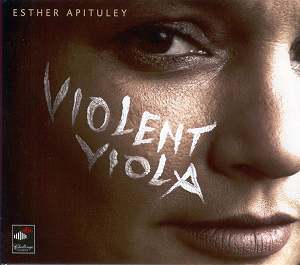"I wrestle with
my viola as if it was my life.
It is true that the viola chose me.
Not the other way round." Esther
Apituley
Challenge Records International,
the Netherlands-based independent record
label, have released a new recording
titled Violent Viola as a showcase
for the talents of Dutch violist Esther
Apituley.
Violent Viola
is a collection which covers an eclectic
range of works that feature the viola.
Represented are eleven scores from ten
composers. They date from the 16th century
with two works by John Dowland, through
to the 20th century with works from
Kodaly and Britten. Three of the compositions
were originally scored for violin and
piano and have been adapted for the
viola and piano. Also included is Apituley’s
own brief composition Pizzicato
for viola quartet.
Esther Apituley was
born in Amsterdam. She started playing
the violin at the age of twelve, soon
switching to the viola. After graduating
from the Amsterdam Sweelinck Conservatory,
she took lessons at the Hochschule Für
Musik in Berlin. During the early years
of her studies, she was also active
as a singer and saxophonist in the field
of light music. She currently teaches
viola at the Amsterdam Sweelinck Conservatory.
In 1990 Apituley gave her first solo
viola recital in the Concertgebouw,
Amsterdam. Her enthusiastically received
performances went some way to disprove
the prevailing image of the viola as
a voice in the middle range, serving
others. She has played as a soloist
with the National Ballet Orchestra,
North Holland Philharmonic, Metropole
Orchestra and the Radio Chamber Orchestra.
Her repertoire includes the viola concertos
by Berlioz, Bartók and Chiel
Meijering as well as Mozart’s Sinfonia
Concertante K364 and Britten’s Lachrymae.
Alongside the two greatest
viola players of our time, Kim Kashkashian
and Yuri Bashmet, Apituley has worked
tirelessly to bring the viola out from
under the shadows of the violin and
cello. She sees her priority to present
programmes and projects that are characterised
by their originality, versatility, and
accessibility to the audience. In 2000,
she founded the Amsterdam Viola Quartet.
Together with their emphasis on distinctive
performance presentation their eclectic
repertoire consists of contemporary
and established classical music along
with tango and present day styles.
Hindemith was part
of a dying breed of composers who were
known for performing their own works.
He would often play this Sonata in
five parts for solo viola on his
tours of Europe and the USA. One its
most striking features is its tightness
in formal construction. There are many
parts, especially the first and fourth
movements, which sound strikingly suggestive
of a steam locomotive. Apituley provides
robustly serious and haunting playing
in the angular rhythms and toneless
virtuosity of this spectacular work.
She achieves consistent tension, singing
strongly with her richest tone. The
biting machine gun-like athleticism
of the penultimate movement is astonishingly
well performed. I have alternative in
my collections from Hirofumi Fukai on
Signum SIGX38-00 and Nobuko Imai on
BIS CD571 but none of these is superior
to Apituley’s winning account.
Britten’s Lachrymae
was written in 1950 and dedicated
at Aldeburgh to the violist, William
Primrose "to reward him for coming
to the Festival." Despite Britten’s
own skill as a violist, Lachrymae
is his only work in which the viola
is the principal soloist. Lachrymae
comprises a set of ten variations
with a slow introduction and coda on
the opening part of Dowland’s lute song.
With authority and concentration the
duo of Apituley and Tanaka take the
listener through this shadowy, almost
sinister reverie. Apituley’s playing
makes this a moving experience that
surpasses the much admired evergreen
1963 London account from violist Margaret
Major, with Britten on the piano, on
BBC Music BBCB 8014-2.
The exquisite Adagio
is one of Kodály’s most attractive
scores, a reflectively poignant lament
that seems evocative of a lost love
affair. Grave and introspective the
score comes to a passionate climax in
the highest register of the instrument.
Before hearing this interpretation I
didn’t realise that this score could
be so affecting. The intense and characterful
playing brings a shiver or two down
the spine. A magical performance.
Vieuxtemps’s Elégie
was published in 1854. This interpretation
is a devoutly moving experience. The
sweeping melodic lines of this openly
arresting score are especially alluring
in Apituley’s hands. This excellent
account is a match for the established
recording from Kim Kashkashian and Robert
Levin on EMC 8277442.
Kaddish is a
viola and piano arrangement of the first
of Ravel’s Deux Mélodies Hébraïques
for voice and piano from 1914. It
is a liturgical chant, a prayer for
the dead, originating in the 13th century.
The words of the chant being omitted,
the music still profoundly carries the
lamenting contents. A popular score,
Ravel’s Kaddish has been widely
circulated in various arrangements.
Apituley conveys a deeply reverential
quality to her exceptional playing which
is closely caught.
J.S. Bach’s Adagio
is an arrangement for solo viola
of the first movement from the first
sonata in his set of six Sonata and
Partitas for solo violin, BWV 1001.
The indomitable Apituley plays it with
convincing directness and irrefutable
confidence.
The Chanson Russe
(Russian maiden’s song) is
an adaptation of the Parasha’s aria
from Stravinsky’s comic opera Mavra.
This is a work of poignant emotions,
of haunting beauty, of wistful melancholy.
The interpretation here is evocative
of swaggering down a city street without
a care in the world.
Challenge Classics
have provided an ice cool and brightly
detailed sound quality that is well
balanced. On the downside I found the
track listings rather confusing and
irritatingly the timings are not provided.
The annotation contained very little
information on the actual works.
Those looking for a
collection of rewarding and approachable
string music that tends to avoid the
mainstream need not hesitate. Esther
Apituley plays her ‘Violent Viola’
with distinction.
Michael Cookson


